Lab Personnel




Pears, K. C., Kim, H. K., & Fisher, P. A. (2008). Psychosocial and cognitive functioning of children with specific profiles of maltreatment. Child Abuse and Neglect, 32, 958-971.
Pears, K. C., Capaldi, D. M., & Owen, L. D. (2007). Substance use risk across three generations: The roles of parent discipline practices and inhibitory control. Psychology of Addictive Behaviors, 21, 371-386.
Pears, K. C., Fisher, P. A., & Bronz, K. D. (2007). An intervention to promote social emotional school readiness in foster children:Preliminary outcomes from a pilot study. School Psychology Review, 36(4), 665-673.
Pears, K. C., Fisher, P. A., Heywood, C. V., & Bronz, K. D. (2007). Promoting school readiness in foster children. In O. N. Saracho & B. Spodek (Eds.), Contemporary perspectives on social learning in early childhood education (pp. 173-198). Charlotte, NC: Information Age.
Pears, K. C., & Fisher, P. A. (2005). Emotion understanding and theory of mind among maltreated children in foster care: Evidence of deficits. Development and Psychopathology, 17, 47-65.


Jackie Bruce, Ph.D. - Scientist



Hyoun Kim, Ph.D. - Scientist



Martin, C. G., Kim, H. K., Bruce, J. M., & Fisher, P. A. (2014). Child diurnal cortisol rhythms, parenting quality, and externalizing behaviors in preadolescence. Psychoneuroendocrinology, 40, 170-180.
Martin, C. G., Cromer, L. D., DePrince, A. D., & Freyd, J. J. (2013). The role of cumulative trauma, betrayal, and appraisals in understanding trauma symptomatology. Psychological Trauma: Theory, Research, Practice, and Policy, 5, 110-118.
Martin, C. G., Bruce, J., & Fisher, P. A. (2012). Racial and ethnic differences in diurnal cortisol rhythms in preadolescents: The role of parental psychosocial risk and monitoring. Hormones and Behavior, 61, 661-668.
Martin, C. G., Fisher, P. A., & Kim, H. K. (2012). Risk for maternal harsh parenting in high-risk families from birth to age three: Does ethnicity matter? Prevention Science, 13, 64 – 74.
Martin, C. G., Cromer, L. D., & Freyd, J. J. (2010). Teachers’ beliefs about maltreatment effects on student learning and classroom behavior. Journal of Child and Adolescent Trauma, 3, 245–254.


Cynthia Healey, Ph.D. - Research Associate

Rick Bryck, Ph.D. - Research Associate
Paulina Nowicka Ph.D. - Research Associate


Christina Gamache Martin - Graduate Student

Amanda Van Scoyoc - Graduate Student



Kristen Greenley - Project Coordinator


Kyndal Howell - Coordinator
Kim, H. K., Pears, K. C., Fisher, P. A., Connelly, C., & Landsverk, J. L. (in press). Trajectories of harsh maternal parenting in the First 3 Years of Life. Child Abuse & Neglect. [PMC-In Process]
Pears, K., Fisher, P. A., Bruce, J., Kim, H., & Yoerger, K. (in press). Early elementary school adjustment of maltreated children in foster care: The roles of inhibitory control and caregiver involvement. Child Development. [NIHMSID: 119117]
Fisher, P. A., Kim, H. K., & Pears, K. C. (2009). Effects of Multidimensional Treatment Foster Care for Preschoolers (MTFC-P) on reducing permanent placement failures among children with placement instability. Child and Youth Services Review, 31, 541–555. [PMC2678807]
Kim, H. K., Pears, K. C., Capaldi, D. M., & Owen, L. D. (2009). Emotion dysregulation in the intergenerational transmission of romantic relationship conflict. Journal of Family Psychology, 23, 585–595. [NIHMHSID111455]
Kim, H. K., Capaldi, D. M., Pears, K. C., Kerr, D. C. R., & Owen, L. D. (2009). Intergenerational transmission of internalizing and externalizing behaviours across three generations: Gender specific pathways. Criminal Behaviour and Mental Health, 19, 125–141.[PMC2715275]
Pears, K. C., Kim, H. K., Healey, C. V., Yoerger, K., & Fisher, P. A. (2013) Improving child self-regulation and
parenting in families of pre-kindergarten children with developmental disabilities and behavioral difficulties.
Manuscript submitted for publication.
Pears, K. C., Fisher, P. A., Kim, H. K., Bruce, J., Healey, C. V., & Yoerger, K. (2013). Immediate effects of a
school readiness intervention for children in foster care. Early Education and Development, 24, 771-791.
Healey, C. V., Fisher, P. A., Van Scoyoc, A., & Relling, A. M. (2013). Family-based interventions for children
with prenatal substance exposure. In N. E. Suchman, M. Pajulo, & L. C. Mayes (Eds.) Parenting and
substance abuse: Developmental approaches to intervention (pp. 487-513). New York: Oxford University
Press.
Healey, C. V., & Fisher, P. A. (2011). Young children in foster care and the development of favorable outcomes.
Children and Youth Services Review, 33, 1822-1830
Gold, R., & Healey, C. V. (2011). Implementing Multidimensional Treatment Foster Care (MTFC). In A. Ruben &
D. Springer (Eds.) Programs and Interventions for Maltreated Children and Families at Risk (pp. 43-57)
Hoboken, NJ: Wiley.
* also published under Cynthia V. Heywood *
Heywood, C. V., Fisher, P. A., & Tang, Y. (2011). Mindfulness training: A promising approach for addressing the
needs of child welfare system children and their families. In J. A. Jaworski (Ed.), Advances in Sociology
Research: Vol. 8 (pp. 1-29). Hauppauge, NY: Nova Science Publishers.
Pears, K. C., Heywood, C. V., Kim, H. & Fisher, P. A. (2011). Prereading deficits in children in foster care. School
Psychology Review, 40(1).




Leslie Roos - Graduate Student

Kate Gilliam - Graduate Student





Bruce, J., Fisher, P. A., Graham, A. M., Moore, W. E., Peake, S. J., & Mannering, A. M. Patterns of
brain activation in foster children and nonmaltreated children during an inhibitory control task.
Development and Psychopathology, 25, 931-941.
Bruce, J., Gunnar, M. R., Pears, K. C., & Fisher, P. A. (2013). Early adverse care, stress neurobiology, and
prevention science: Lessons learned. Prevention Science, 14, 247–256.
Bruce, J., Fisher, P. A., Pears, K. C., & Levine, S. (2009). Morning cortisol levels in preschool-aged foster
children: Differential effects of maltreatment type, Developmental Psychobiology, 51, 14-23.
Bruce, J., McDermott, J. M., Fisher, P. A., & Fox, N. A. (2009). Using behavioral and electrophysiological
measures to assess the effects of a preventive intervention: A preliminary study with preschool-aged
foster children, Prevention Science, 10, 129-140.
Bruce, J., Tarullo, A., R., & Gunnar, M. R. (2009). Disinhibited social behavior among internationally
children, Development and Psychopathology, 21, 157-171.
Roos L.E., Kim, H., Neiderhiser, J., Shaw D.,Reiss, D., Natsuaki, M., Leve, L. Inherited and Environmental Influences on a Childhood Co-Occurring Symptom Phenotype: Evidence From an Adoption Study. Development and Psychopathology, in press.
Bhaskaran, J., Wang, Y, Roos, L., Sareen, J., Skakum, K. Bolton, J. (2014) Method of suicide Attempt and Reaction to Survival as Predictors of Repeat Suicide Attempts: A Longitudinal Analysis. Journal of Clinical Psychiatry, in press
Roos, L.E., Pears, K., Bruce, J, Kim, H., Fisher, P., (2014). Impulsivity and the Association between the Feedback-Related Negativity and Performance on an Inhibitory Control Task in Young At-Risk Children. Psychophysiology, in press.
Roos, L. E., Distasio, J., Bolton, S. L., Katz, L. Y., Afifi, T. O., Isaak, C., ... & Sareen, J. (2013). A history in-care predicts unique characteristics in a homeless population with mental illness. Child abuse & neglect, in press
Roos, L. E., Mota, N., Afifi, T. O., Katz, L. Y., Distasio, J., & Sareen, J. (2013). Relationship Between Adverse Childhood Experiences and Homelessness and the Impact of Axis I and II Disorders. American journal of public health, 103(S2), S275-S281.
Roos, L., Sareen, J., & Bolton, J. M. (2013). Suicide risk assessment tools, predictive validity findings and utility today: time for a revamp? Neuropsychiatry, 3(5), 483-495.
Roos, L. E., Lebrecht, S., Tanaka, J. W., & Tarr, M. J. (2013). Can singular examples change implicit attitudes in the real-world?. Frontiers in psychology, 4.
Sciberras, Roos, & Efron. (2009) Review of prospective longitudinal studies of children with ADHD: Mental health, educational, and social outcomes. Current Attention Disorders Reports, 1(4).
Bryck, R. L., & Fisher, P. A. (2012). Training the brain: Practical applications of neural plasticity
from the intersection of cognitive neuroscience, developmental psychology, and prevention
intervention science. American Psychologist, 67(2), 87-100.
Jost, K., Bryck, R.L., Vogel, E.K., & Mayr, U. (2010). Are old adults just like low working memory young adults? Filtering efficiency and age differences in visual working memory. Cerebral Cortex: doi: 10.1093/cercor/bhq185
Bryck, R.L. & Mayr, U. (2008). Switch cost asymmetry without switching. Psychonomic Bulletin & Review, 15(1), 128-134.
Mayr, U. & Bryck, R. (2007). Outsourcing control to the environment: effects of stimulus/response locations on task selection. Psychological Research, 71, 107-116.
Bryck, R.L. & Mayr, U. (2005). On the role of verbalization during task-set selection: Switching or serial order control? Memory and Cognition, 33, 611-623.


Anne Mannering, Ph.D. - Research Associate


Selected Recent Pubs:
Graham, A. M., Pfeifer, J. H., Fisher, P. A., Lin, W., Gao, W., & Fair, F. A. (2015). The potential of infant fMRI research
and the study of early life stress as a promising exemplar. Developmental Cognitive Neuroscience, 12, 12-39.
Delker, B. C., Kim, H., Fisher, P. A. (2014). First time's a charm: Maternal problem drinking around the birth of a child in
primiparous and multiparous women at risk for child maltreatment. J. Stud. Alcohol Drugs, 75, 973-981.
Delker, B. C., Noll, L. K., Kim, H. K., & Fisher, P. A. (2014). Maternal abuse history and self regulation difficulties in
preadolescence. Child Abuse & Neglect.
Roos, L. E., Pears, K., Bruce, J., Kim, H., Fisher, P. (2014). Impulsivity and the association between the feedback-related
negativity and performance on an inhibitory control task in young at-risk children. Psychophysiology. doi: 10.1111
psyp.12389
Fisher, P. A., Mannering, A. M., Van Scoyoc, A., & Graham, A. M. (2013). A translational neuroscience perspective on
the importance of reducing placement instability among foster children. Child Welfare, 92, 9-36. (PubMed Central -
in process)
Shonkoff, J. P. & Fisher, P.A. (in press). Rethinking evidence-based practice and two-generation programs to create the
future of early childhood policy. Development and Psychopathology.
Weller, J. A., & Fisher, P. A. (2013). Decision-making deficits among maltreated children. Child Maltreatment, 18,
184-194.
Bruce, J., Gunnar, M. R., Pears, K. C., & Fisher, P. A. (2013). Early adverse care, stress neurobiology, and
prevention science: Lessons learned. Prevention Science, 14, 247-256.
Graham, A.M., Fisher, P.A., Pfeifer, J.H. (2013). What Sleeping Babies Hear: An fMRI Study of Interparental
Conflict and Infants’ Emotion Processing. Psychological Science, 24, 782-789.
Fisher, P. A., Kim, H. K., Bruce, J., & Pears, K. C. (2012). Cumulative effects of prenatal substance exposure and early
adversity on foster children’s HPA-axis reactivity during a psychosocial stressor. International Journal of
Behavioral Development, 36(1), 29-35.
Graham, A., Kim, H. K., & Fisher, P. (2012). Partner aggression in high-risk families from birth to age 3: Associations
with harsh parenting and child maladjustment. Journal of Family Psychology, 26, 105-114.
Martin, C., Fisher. P., & Kim, H. K. (2012). Risk for maternal harsh parenting in high-risk families from birth to age
three: Does ethnicity matter? Prevention Science, 13, 64-74.
Bryck, R. L., & Fisher, P. A. (2011). Training the brain: Practical applications of neural plasticity from the intersection of
cognitive neuroscience, developmental psychology, and prevention/intervention science. American Psychologist.
Fisher, P. A., Lester, B. M., DeGarmo, D. S., LaGasse, L. L., Lin, H., Shankaran, S., Bada, H. S., Bauer, C. R., Hammond, J.,
Whitaker, T., & Higgins, R. (2011). The combined effects of prenatal drug exposure and early adversity on
neurobehavioral disinhibition in childhood and adolescence. Development and Psychopathology, 23(3), 777-788.
Fisher, P. A., & Pfeifer, J. H. (2011). Conceptual and methodological issues in neuroimaging studies of the effects of
child maltreatment. Archives of Pediatrics and Adolescent Medicine, 165, 1133-1134.
Fisher, P. A., Stoolmiller, M., Mannering, A. M., & Chamberlain, P. (2011). RCT intervention effects on foster placement
disruptions associated with problem behavior. Journal of Consulting and Clinical Psychology, 79, 481-487.
Fisher, P. A., Van Ryzin, M. J., & Gunnar, M. R. (2011). Mitigating HPA axis dysregulation associated with placement
changes in foster care. Psychoneuroendocrinology, 36, 531-539.
Fisher, P. A., & Gunnar, M. R. (2010). Early life stress as a risk factor for disease in adulthood. In R. A. Lanius, E.
Vermetten, & C. Pain (Eds.), The impact of early life trauma on health and disease (pp. 133-141). Cambridge, UK:
Cambridge University Press.
Pears, K., Bruce, J., Fisher, P., & Kim, H. (2010). Indiscriminate friendliness in maltreated foster children. Child
Maltreatment, 15, 64-75.
Bruce, J., Fisher, P. A., Pears, K. C., & Levine, S. (2009). Morning cortisol levels in preschool-aged foster children:
Differential effects of maltreatment type. Developmental Psychobiology, 51, 14-23.
Fisher, P. A., & Stoolmiller, M. (2008). Intervention effects on foster parent stress: Associations with child cortisol
levels. Development and Psychopathology, 20, 1003-1021.
Fisher, P. A., & Kim, H. K. (2007). Intervention effects on foster preschoolers' attachment-related behaviors from a
randomized trial. Prevention Science, 8, 161-170
Fisher, P. A., Stoolmiller, M., Gunnar, M. R., & Burraston, B. (2007). Effects of a therapeutic intervention for foster
preschoolers on diurnal cortisol activity. Psychoneuroendocrinology.
Fisher, P. A., Gunnar, M., Dozier, M., Bruce, J., & Pears, K. C. (2006). Effects of a therapeutic intervention for foster
children on behavior problems, caregiver attachment, and stress regulatory neural systems. Annals of the New
York Academy of Sciences, 1094, 215-225.
Gunnar, M. R., Fisher, P. A., & The Early Experience, Stress, and Prevention Science Network. (2006). Bringing basic
research on early experience and stress neurobiology to bear on preventive intervention research on neglected
and maltreated children. Development and Psychopathology, 18, 651-677.
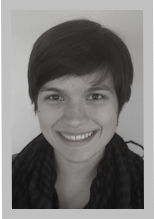
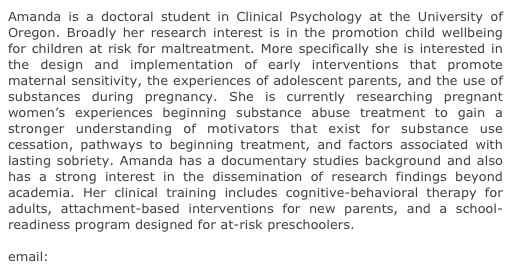

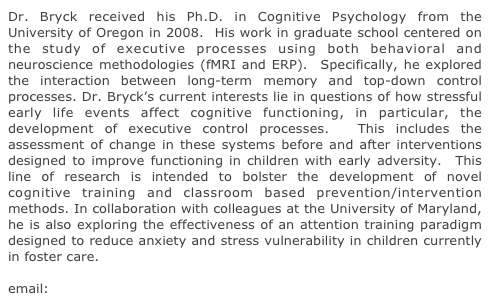



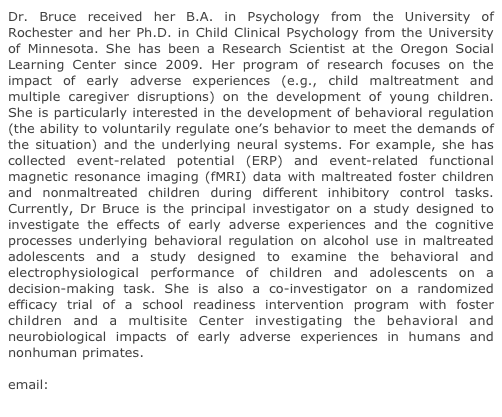

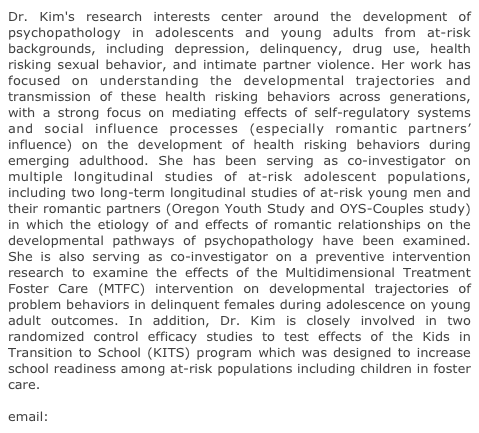

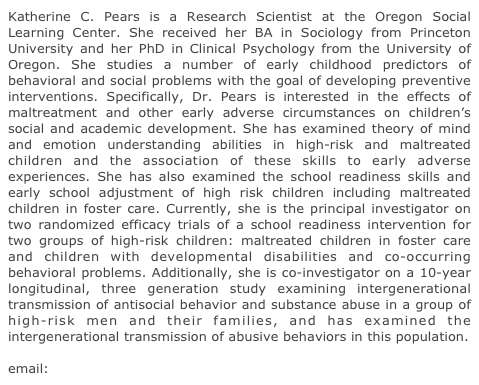



Katherine Pears, Ph.D. - Scientist
Phil Fisher, Ph.D. - Director


Melissa Yockelson - Graduate Student

Ida Moadab - Graduate Student


Brianna Delker - Graduate Student
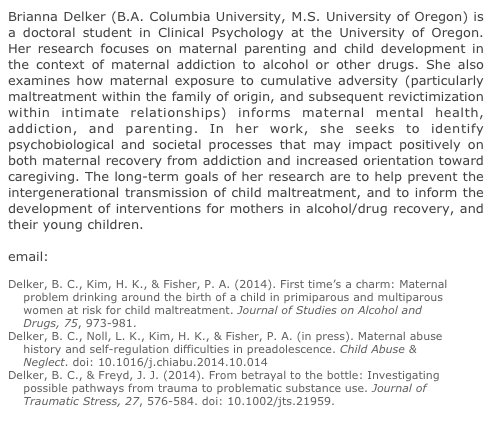


Laura Noll - Graduate Student
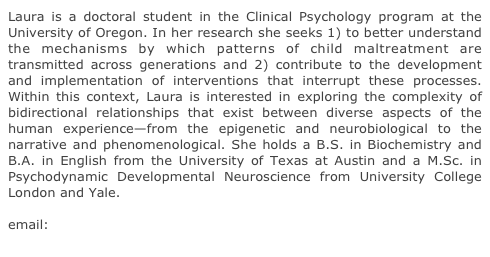


Noll, L. K., Mayes, L. C., & Rutherford, H. J. (2012). Investigating the impact of
parental status and individual differences in depression symptoms on early
perceptual coding of infant faces: An event-related potential study. Social
Neuroscience 7(5), 525-536.
Graham, A. M., Yockelson, M., Kim, H. K., Bruce, J.B., Pears, K.P., & Fisher, P.A
(2012). Effects of Maltreatment and Early Intervention on Diurnal Cortisol
Across the Start of School: A Pilot Study. Child Abuse & Neglect, 36, 666-670.
Prull, M. W., & Yockelson, M. B. (2013). Adult age‐related differences in the
misinformation effect for context‐consistent and context‐inconsistent objects.
Applied Cognitive Psychology.
Livia Carpenter is a Master’s student at the University of Oregon. She is interested in research and prevention concerning the effects of early life stress on child development and behavior. More specifically, she is interested in the effects of foster care on social/emotional development and self regulation. After completing her BS in 2008, she worked with children from maltreated & high risk populations through OSLC Community Programs and Oregon Social Learning Center.
email: liviac@oslc.org
Livia Carpenter - Graduate Student

Graham, A.M., Pfeifer, J.H., & Fisher, P.A. (2013). What Sleeping Babies Hear: An fMRI Study of Interparental
Conflict and Infants’ Emotion Processing. Psychological Science, 24(5), 782-789.
Berkman, E.T., Graham, A.M., & Fisher, P.A. (2012). Training self-control: A domain-general translational
neuroscience approach.Child Development Perspectives, 6(4), 374–384.
Bruce, J., Fisher, P.A., Graham, A.M., Moore, W.E., Peake, S. & Mannering, A.M. (in press) Patterns of Brain
Activation in Foster Children and Nonmaltreated Children During an
Inhibitory Control Task. Development and Psychopathology.
Berkman, E.T., Graham, A.M., & Fisher, P.A. (in press). Training self-control: A domain-general translational
neuroscience approach. Child Development Perspectives.
Graham, A. M., Yockelson, M., Kim, H. K., Bruce, J.B., Pears, K.P., & Fisher, P.A (2012). Effects of Maltreatment
and Early Intervention on Diurnal Cortisol Across the Start of School: A Pilot Study. Child Abuse & Neglect, 36,
666-670.
Graham, A. M., Kim, H. K., & Fisher, P.A (2012). Partner Aggression in High-Risk Families from Birth to Age 3:
Associations with Harsh Parenting and Child Maladjustment. Journal of Family Psychology, 26(1), 105-114.
Graham, A.M., Ablow, J.C., & Measelle, J. R. (2010). Interparental Relationship Dynamics and Cardiac Vagal
Functioning in Infancy. Infant Behavior and Development, 33, 530–544.
Alice Graham - Graduate Student
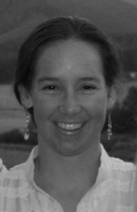
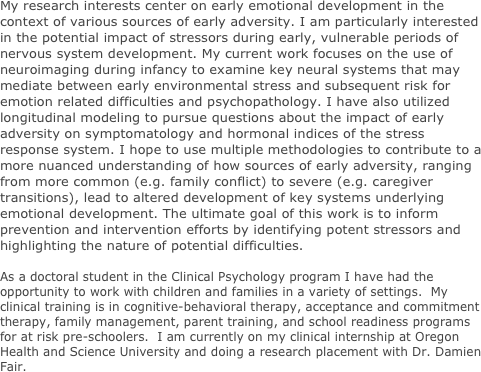
Jessica Flannery - Graduate Student
Jessica Flannery is a graduate student in the clinical psychology program at the University of Oregon. Her research interests broadly focus on how early adverse experiences affect neuroendocrine pathways and function as well their impact on the development of brain structures and connectivity between brain regions specifically associated with social and emotional development. After completing her BS in 2010, she worked as the lab manager of the Developmental Affective Neuroscience Lab at UCLA.
email: jflanner@uoregon.edu




Ursula Tooley- Research Assistant & Coordinator
